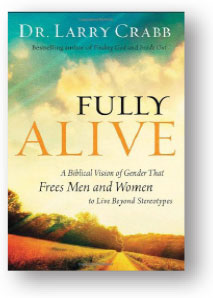 Fully Alive: A Biblical Vision of Gender That Frees Men and Women to Live Beyond Stereotypes
Fully Alive: A Biblical Vision of Gender That Frees Men and Women to Live Beyond Stereotypes
Larry Crabb
Baker Book House
What do the terms masculine and feminine mean to you? In the conversation launched at the MB study conference last fall and continuing in 2015, both the biblical and cultural definitions of gender and their implications for our witness and mission as a church are being wisely explored. In his compelling book Fully Alive, Christian psychologist and author Larry Crabb calls us to push beyond cultural stereotypes or misappropriations and into the territory of careful biblical study. “What I’m not hearing in our sex/gender debates today is a thoughtful, biblically dependent, open-minded discussion of what it means for men to resemble God in their masculinity and for women, with equal importance but uniquely and differently, to resemble God in their femininity.”
Beginning with a study of Genesis 1:27, Crabb suggests that an integrated part of bearing the image of God is bearing the image of relational community. And as such, when we discover who we are meant to be, we discover this in community. For Crabb, this means that the core element of our gendered uniqueness will only be fully uncovered as we learn to relate to God and others in ways that move beyond our struggles and histories, our circumstances or successes and are driven by a genuine desire to reveal God authentically to the world.
This is a powerful message for those wrestling with a sense of failure to measure up to what it means to be male or female in our culture today but it is also a clarion call for the church to be both a healing and a formative community on the topic of gender.
Crabb tells a personal tale of being successful but not masculine. Driven but empty. His conclusions about his own journey, that of his own father, and others around him drove him back to the Bible where he saw a fresh vision of masculinity. It was one that lived between the positive polarity of moving toward others and having an impact in their lives and the negative “core terror” of failing and feeling weightless.
Crabb posits that men are wired as doers and when they live out this calling but nothing happens or they experience great success but no purpose, they feel hollow and lost. Men can hide behind accomplishments or bravado or professional success, but inside feel the weight of being alone.
The challenge, says Crabb, is that “no one heals in hiding.” Men especially must wrestle with the notion that masculinity has relational components hard-wired into it.
For women, Crabb suggests that “an authentically feminine woman is so at rest in God’s delight in her indestructible beauty that she refuses to be a slave to her fear of invisibility. She therefore relates invitationally, not controllingly; openly, not guardedly; courageously not defensively; and freely, not protectively.” It is a vision that takes several chapters to unpack, but when he is finished, you really want to give yourself more fully to becoming the kind of person that is described.
The book is a fascinating exploration with many helpful case studies. One or two of them may just hold up a mirror to your own soul.
The hard truth is that if you want to come fully alive – to know and be known as a feminine woman or a masculine man – then you will need to learn to walk the narrow road of self-sacrifice that leads to abundant life. When we can do this together as men and women who live out our unique identities as disciples, “the agony of brokenness becomes a celebration of grace. [Because] only those broken by relational failure can hear the sweet music of divine love.”
Brad Sumner is pastor at Jericho Ridge Community Church, Langley, B.C.
 Fully Alive: A Biblical Vision of Gender That Frees Men and Women to Live Beyond Stereotypes
Fully Alive: A Biblical Vision of Gender That Frees Men and Women to Live Beyond Stereotypes